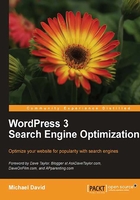
Chapter 2. Customizing WordPress Settings for SEO
In this chapter, we'll align your SEO strategy with the WordPress platform and help you solidify your plan. You'll need to set realistic goals and timelines for your business or website through educated investigation and analysis. Proper and thorough planning is needed to ensure that you succeed in the competitive search markets.
We will begin by setting up the goals for your Internet presence and determining how best to leverage WordPress' flexibility and power for maximum benefit. We'll examine how to best determine and reach out to the specific audience for your goods or services. Different Internet models require different strategies. For example, if your goal is instant e-commerce sales, you strategize differently than if your goal is a broad-based branding campaign. We'll also examine how to determine how competitive the existing search market is, and how to develop a plan to penetrate that market.
It's important to leverage WordPress' strengths. WordPress can effortlessly help you build large, broad-based sites. It can also improve the speed and ease with which you publish new content. It serves up simple, text-based navigation menus that search engines crawl and index easily. WordPress' tagging, pingback, and trackBack features help other blogs and websites find and connect with your content. For these reasons, and quite a few more, WordPress is search ready. In this chapter, we will look at what WordPress already does for your SEO.
Of course, WordPress is designed as a blogging platform and a content management platform not as a platform purely for ranking. We'll look at what WordPress doesn't accomplish innately and how to address that.
Finally, we'll look at how WordPress communicates with search engines and blog update services. Following this chapter, we'll know how to plan out a new site or improve an existing one, how to gauge WordPress' innate strengths and supplant its weaknesses, and learn how WordPress sites get found by search engines and blog engines.